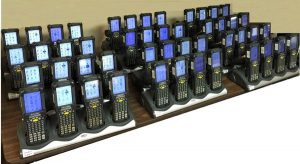A recent report, “Barcode Scanner Market: Global Industry Analysis and Opportunity Assessment, 2017-2027,” released by Future Market Insights (FMI), takes a look at recent, current and projected trends in the barcode scanner market. The major takeaway form the report is that the use of barcode technology is increasing at a significant rate. The use of the technology is rising in a variety of industries, with notable growth occurring within the retail and manufacturing industries. To most observers of the barcode technology industry, the report comes as no surprise. Over the past decade, more businesses than ever before are purchasing barcode scanners, while others are renting barcode scanners for seasonal, temporary or trial purposes. Not only does the FMI report observe a general upward trend going forward, it also comments on the specific reasons for the more widespread adoption of barcode technology. Here is a look at some reasons why businesses are incorporating more barcode technology into their operations and why they are projected to continue doing so in the future.
Fewer Errors
Tracking data using barcodes and barcode scanners has proven to result in fewer errors than when using manual data entry systems like spreadsheets. Current barcode software makes it easy to transfer the scanned data into spreadsheets so that companies can still perform all the data-oriented tasks they’re used to, only with the added benefit of more accurate numbers. As mentioned above, the greater accuracy is helping to improve the efficiency and bottom lines of many companies in the retail and manufacturing sectors. The report points out, though, that the sector benefitting the most from this accuracy going forward is the healthcare industry. Professionals in the healthcare industry—from pharmacists to physicians to those in administrative roles—are using barcode scanners to cut down on medication errors and greater analyze data related to things like the manufacturing dates of medication.

Less Manual Labor
Because of the improved accuracy involved in collecting data with barcode scanners, there is a concurrent reduction in the costs associated with the manual labor of data entry. This doesn’t necessarily mean jobs will be eliminated; often, the quick, accurate data provided by barcode scanners simply frees up workers to focus on other tasks and thereby improves the overall efficiency and bottom line of a company.
Data Analytics
Another reason for the increasing use of barcode scanners is the increasing effectiveness of data analytics. Data is only as valuable as the tools used to work with the data. Thanks to data analysts and data analysis software can do more with data than ever before, from incorporating it into their marketing strategy to increasing the efficiency of their supply chain. As a result, data is more valuable than ever. As a company is able to access it more quickly, it becomes more valuable; as a company is able to better ensure its accuracy, it also becomes more valuable.
Going Forward
One interesting prediction noted by the report is a shift toward camera-based barcode readers. Currently, most scanners use laser technology to read barcodes, but this may change going forward. While laser scanners are expected to maintain the largest share of the market, camera-based readers will become more popular. As with other forms tech hardware like computers and cell phones, there will also be a continued trend toward smaller sizes. Hand-held scanners are also expected to rise in effectiveness and popularity going forward.



